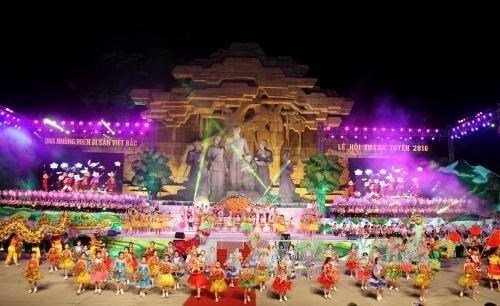
The first national intangible cultural heritage festival will take place simultaneously with the Tuyen Quang City Festival in the northern mountainous province of Tuyen Quang from September 20-23.

At the Tuyen Quang City Festival (Source: VNA)
During a press conference held in Hanoi on September 7, the
organising board said the heritage festival will be co-hosted by the Ministry
of Culture, Sports and Tourism and the provincial People’s Committee in order
to honour the treasure of national intangible heritages across the country,
contributing to realising the Resolution adopted by the ninth conference of the
11th Party Central Committee on building and developing Vietnamese culture and
humans to meet sustainable development demand.
Art troupes at the event will give performances of Central Highlands gongs,
Quan ho singing (love duet singing), Then singing by Tay ethnic group, rituals
worshipping Mother Goddess in Tuyen Quang, and jumping over fire by Pa Then
ethnic group.
Don ca tai tu (amateur singing) from the southern region and several other
traditional art forms will also be brought on stage.
Meanwhile, the Tuyen Quang City Festival will introduce images of its land,
people and cultural heritages to domestic and foreign visitors.
During the festival, an exhibition of photos and cultural heritage artifacts
and a seminar on preserving and upholding the national intangible cultural
heritage in tandem with tourism development will also be held.
Source: VNA
With an increasingly vibrant and widespread emulation movement aimed at building cultured residential areas and cultured families, Yen Thuy District has been making steady progress toward improving both the material and spiritual well-being of its people, while fostering a civilized, prosperous, beautiful, and progressive community.
Once lacking recreational spaces and community facilities, Residential Group 2 in Quynh Lam Ward (Hoa Binh City) has recently received attention for the construction of a new, spacious, and fully equipped cultural house. The project followed the model of state support combined with public contributions in both labor and funding.
The "All people unite to build cultural life" movement, which has been effectively integrated with Kim Boi district’s socio-economic development goals, is fostering a lively spirit of emulation across local residential areas, hamlets, villages, public agencies, and enterprises. In addition, through the initiative, traditional cultural values are being preserved and promoted, while community solidarity and mutual support in poverty reduction and economic development are being strengthened.
A working delegation of the Hoa Binh provincial People’s Committee led by its Permanent Vice Chairman Nguyen Van Toan on June 11 inspected the progress of a project to build the Mo Muong Cultural Heritage Conservation Space linked to tourism services in Hop Phong commune, Cao Phong district.
Born and growing in the heroic land of Muong Dong, Dinh Thi Kieu Dung, a resident in Bo town of Kim Boi district, in her childhood was nurtured by the sweet lullabies of her grandmother and mother. These melodies deeply imprinted on her soul, becoming an inseparable part of her love for her ethnic group's culture. For over 20 years, this love for her hometown has driven Dung to research, collect, and pass down the cultural values of the Muong people to future generations.
In the final days of May, the Ethnic Art Troupe of Hoa Binh Province organized performances to serve the people in remote, mountainous, and particularly disadvantaged areas within the province. These were not just ordinary artistic shows, but they were the meaningful journeys aimed at spreading cultural values, enhancing the spiritual life of the people and contributing to the preservation of ethnic minority cultural identities.



